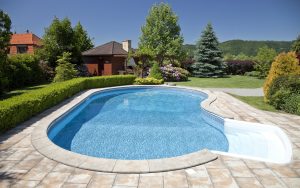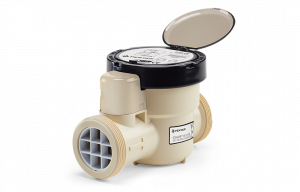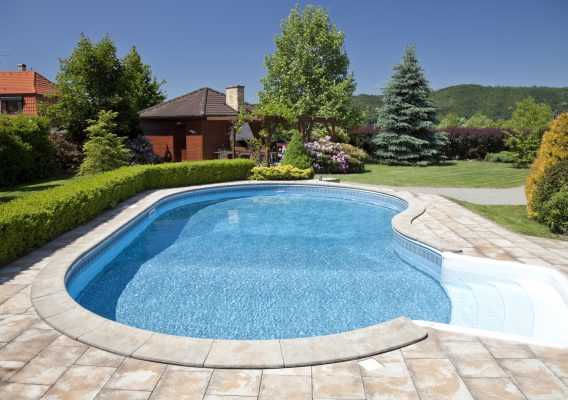
Salt water swimming pools have been around since the 70s, although the popularity has greatly increased in recent years. With the current shortage of pool supplies impacting the 2021 season, specifically with chlorine tablets, many people are wondering if they should convert to a salt water swimming pool. In addition to the many benefits already recognized with a salt water pool system, one of the biggest benefits today is not worrying about buying chlorine.
The conversion process is fairly simple, and here are a few of the most important things that you should know if considering converting to a salt water pool.
How a Salt Chlorine Generator Works
First of all you should know that a salt water pool still uses chlorine to sanitize your water, you just do not have to buy chlorine anymore. The salt generator creates chlorine with an electrolysis process as filtered water passes through the electrolytic chamber where DC current is applied. This produces hydrochloric acid, sodium hydroxide and hydrogen gas. The water reaches a breakpoint in chlorination which destroys inorganic chloramines, the chemical that most commonly causes chlorine odor, foul taste and eye irritation.
Maintaining a Salt Water Pool System
Once you add salt to your pool, the salt generator recycles the salt as the sodium recombines to repeat the process. You may need to add salt due to backwashing or splashing, although you shouldn’t have to add a large quantity after the initial addition.
Other than not buying chlorine for your pool, you still must maintain your pool the same way with the same pool chemistry. You will need to maintain the pH, alkalinity, calcium hardness and stabilizer, although with a salt water system it is likely that you will require fewer chemicals to keep your water balanced.
You use the same filtration system with a salt generator, there is no need to replace your current filter or equipment. You should keep your salt generator clean and descale regularly.
Learn everything you need to know about pool opening: preparing your water, preventing algae, types of chlorine, water testing, and more –
The Ultimate Guide to Pool Opening
Powerful Benefits of Salt Water Pools
If you have ever swam in a salt water swimming pool, you may have noticed the silky smooth feeling of crystal-clear water. One thing you won’t notice is the foul odor of chlorine, itchy eyes, and dry skin. Here are some of the most obvious benefits of a saltwater pool:
- Healthier skin and eyes – A saltwater pool makes swimming much more pleasurable, with many benefits for your skin and eyes. The chlorine levels are stable in a saltwater pool without the presence of chloramines. The salinity level in a saltwater pool is close to the salinity level of your natural tears; this is why it does not hurt when you open your eyes underwater in a saltwater pool, as long as the pH level is within a healthy range. A pH level between 7.2 to 7.8 is in balance and ideal for eye comfort, anything outside of this range and you may experience burning, uncomfortable eyes from your pool water.
- Better for your hair – the salt water system is much healthier for your hair, especially for any blondes who have ever experienced green hair from swimming in a chlorine pool. Even a well-maintained chlorine pool will leave your hair dry and can fade hair coloring. If you’ve been used to having to wash the chlorine out of your hair as soon as you get out of the pool, you won’t have to worry about that with a saltwater pool system.
It is actually the copper in the water that turns your hair green with high chlorine levels making it much worse as copper and chlorine bond readily. You should still check the heavy metal levels in your pool, although a saltwater pool is less likely to leave green-stained hair. One of the most common causes of copper in your pool is from copper-based algaecide. Consider a non-copper alternative if this has ever been an issue for you. - Better for your pool liner – The primary reason saltwater pools are easier on pool liners lies in the way they generate chlorine. Saltwater pools use a salt chlorinator to convert salt into chlorine, ensuring a steady and controlled release of chlorine into the pool water. This process results in lower levels of chlorine at any given time compared to traditional pools, where chlorine is added manually in larger, more concentrated doses. The reduced chlorine concentration in saltwater pools minimizes the risk of the liner fading, becoming brittle, or degrading over time, which is often a side effect of exposure to higher chlorine levels in standard pools.
- Reduces respiratory problems – for people with respiratory problems like allergic rhinitis or asthma, you may find that exposure to chlorine exacerbates your symptoms. Your swimming pool should be a healthy and relaxing retreat, not causing you discomfort. A saltwater system might be just what you need to really enjoy your swimming pool without breathing any chlorine dust every time you add chemicals to your pool.
- No need to buy chlorine! – This might be the greatest benefit, especially this year in the midst of a chlorine tablet shortage. Not having to trek to the pool supply store, haul gallon jugs or heavy buckets of chlorine tablets in and out of your car and into your garage to store and maintain your swimming pool is one of the greatest benefits of a salt water system. While it is not maintenance-free, it surely is a lot more hassle-free than a traditional chlorine pool.
Learn everything you need to know about choosing the best salt water generator, how they work, how to maintain them, and the many benefits they provide.
Free Guide – Salt Water Pool Generators
The Swimming Pool Store recommends converting to a saltwater swimming pool system if it is within your budget and you plan to continue enjoying your swimming pool in the future. You will save money in the long run without the need to buy chlorine, and we are confident you will enjoy all of the healthy benefits of sanitized, silky smooth pool water.
The Swimming Pool Store offers Pentair salt water generators and installation. Just give us a call for more information and we can help you determine the best model and options for your installation.
Contact us now to set up your pool opening and get on the schedule!


